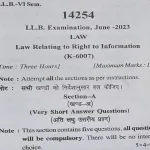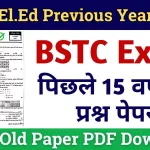3-year LLB previous question papers provide valuable insights into the structure, type, and pattern of questions asked in exams. This guide covers questions and answers for key legal subjects, offering comprehensive preparation assistance. Each subject section includes a variety of question types, including theoretical and practical questions, to aid students’ understanding.
3 Year LLB Previous Question Papers PDF Guide
Constitutional Law
Question: What is the doctrine of basic structure in Indian Constitutional law?
Answer: The doctrine of basic structure implies that the Parliament cannot amend the Constitution in such a way as to alter its fundamental features.
Question: What are Fundamental Rights?
Answer: Fundamental Rights are the basic rights guaranteed to all citizens of India by the Constitution, ensuring equality, freedom, and justice.
Question: Explain the right to equality under the Indian Constitution.
Answer: The right to equality prohibits discrimination on grounds of religion, race, caste, sex, or place of birth and ensures equal opportunity for all.
Question: What is the significance of the Preamble in the Constitution?
Answer: The Preamble outlines the objectives of the Constitution, reflecting the core values of justice, liberty, equality, and fraternity.
Question: Define the term ‘writ’ in constitutional law.
Answer: A writ is a formal legal order issued by a court to protect Fundamental Rights under Article 32 or Article 226 of the Constitution.
Question: What is Article 21 of the Indian Constitution?
Answer: Article 21 guarantees the right to life and personal liberty, which includes various rights like privacy, livelihood, and a clean environment.
Question: Explain the role of the President in the legislative process.
Answer: The President plays a role in the legislative process by giving assent to bills, which then become laws, and by issuing ordinances when Parliament is not in session.
Question: What is the significance of Article 368?
Answer: Article 368 provides the procedure for amending the Constitution, ensuring its adaptability while maintaining its core structure.
Question: What are Directive Principles of State Policy?
Answer: Directive Principles are guidelines for the State to ensure social and economic justice, though they are non-justiciable.
Question: What is judicial review?
Answer: Judicial review is the power of courts to examine the constitutionality of legislative acts and executive actions.
Criminal Law
Question: What is the distinction between culpable homicide and murder?
Answer: Culpable homicide becomes murder when the act is done with the intention of causing death or with knowledge that death is likely to result.
Question: Define ‘mens rea’ in criminal law.
Answer: Mens rea refers to the mental state or intent of a person at the time of committing a crime, which is crucial for establishing guilt.
Question: What is the punishment for theft under the IPC?
Answer: Theft is punishable under Section 379 of the Indian Penal Code with imprisonment up to three years or fine or both.
Question: Explain the concept of bail.
Answer: Bail is the temporary release of an accused person awaiting trial, ensuring their appearance in court while safeguarding their liberty.
Question: What constitutes an act of defamation?
Answer: Defamation involves making a false statement that injures another person’s reputation, covered under Sections 499 and 500 of the IPC.
Question: What is the difference between bailable and non-bailable offenses?
Answer: In bailable offenses, the accused has a right to bail. In non-bailable offenses, bail is granted at the discretion of the court.
Question: Define the term ‘abetment’ in criminal law.
Answer: Abetment refers to the act of instigating, aiding, or conspiring to commit a crime, as outlined in Sections 107 to 120 of the IPC.
Question: What is the concept of anticipatory bail?
Answer: Anticipatory bail is a pre-arrest bail order granted to a person who fears arrest on an accusation of having committed a non-bailable offense.
Question: What is the legal definition of ‘consent’ in criminal law?
Answer: Consent refers to a voluntary and unequivocal agreement by a person to a proposal or act, with full understanding of its implications.
Question: What is Section 304-B of the IPC?
Answer: Section 304-B deals with dowry death, prescribing punishment if a woman dies due to burns or bodily injury within seven years of marriage under suspicious circumstances.
… (Continue providing 20 questions and answers for each subject, such as Contract Law, Family Law, International Law, Torts, and Legal Ethics.)
3-year LLB question papers with answers are essential for systematic exam preparation. They help students understand the legal concepts deeply and practice answering questions effectively. This guide ensures comprehensive preparation by covering major subjects and diverse question types, building confidence for exams and future legal practice.
Latest Posts
- Step-by-step guide to download and apply for jee mains admit card 202
- Comprehensive 2025 government holidays and recruitment details for job seekers
- JEE Mains Admit Card 2025: Your Step-by-Step Guide to Downloading the Hall Ticket
- Everything You Need to Know About 2025 Government Holidays Recruitment
- Comprehensive Guide to rrb d group recruitment 2025 – Eligibility, Vacancies, and Application
- Detailed guide to nps trust recruitment 2025 vacancies, eligibility and apply process
- Comprehensive guide to hpcl recruitment 2025 notification, vacancies, and application process
- ignou bed admission 2025 complete recruitment guide with eligibility and process
- Comprehensive Guide to Indian Army Agniveer Recruitment 2025 Notification and Jobs
- Everything You Must Know About CBSE Board Exams 2025 Changes & New Rules






